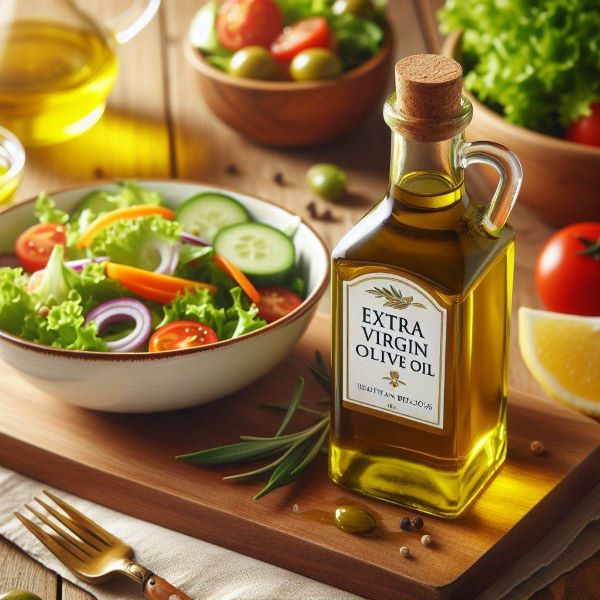Olive oil, a staple of the Mediterranean diet, is celebrated worldwide for its rich flavor, health benefits, and versatility. Extracted from the fruit of the olive tree (Olea europaea), olive oil has been used for thousands of years in cooking, medicine, cosmetics, and religious rituals. This article provides a comprehensive overview of this oil, including its nutritional profile, benefits, uses, therapeutic advantages, properties, side effects, and interesting facts, all supported by scientific evidence. (Source)
Nutritional Profile of Olive Oil
It is rich in monounsaturated fats, antioxidants, and several essential nutrients. Here’s a detailed look at its nutritional components:
- Monounsaturated Fats: Primarily oleic acid (up to 73%), which is known for its heart health benefits. (Source)
- Polyunsaturated Fats: Including omega-3 and omega-6 fatty acids.
- Saturated Fats: Approximately 14% of olive oil’s fat content.
- Vitamins: Contains vitamins E and K, which are essential for skin health and blood clotting.
- Polyphenols: Powerful antioxidants like oleuropein, hydroxytyrosol, and oleocanthal, which help reduce inflammation and oxidative stress. (Source)
Benefits of Olive Oil
1. Heart Health
It is renowned for its cardiovascular benefits:
- Reduces LDL Cholesterol: Lowers bad LDL cholesterol while raising good HDL cholesterol, reducing the risk of heart disease.
- Anti-inflammatory: The polyphenols in this oil help reduce inflammation, a key factor in heart disease.
- Blood Pressure: Regular consumption can help lower blood pressure, improving overall cardiovascular health.
2. Antioxidant Properties
It is rich in antioxidants that offer numerous health benefits:
- Reduces Oxidative Stress: Protects cells from damage caused by free radicals .
- Anti-aging: Helps slow down the aging process by protecting the skin and organs from oxidative damage.
3. Digestive Health
It promotes a healthy digestive system:
- Improves Digestion: Stimulates the production of digestive enzymes, aiding in the breakdown and absorption of nutrients.
- Protects Against Ulcers: This can help protect against gastric ulcers by reducing acidity and improving the mucosal lining.
4. Anti-inflammatory Benefits
Its anti-inflammatory properties make it beneficial for various conditions:
- Arthritis Relief: Can help reduce the symptoms of rheumatoid arthritis when combined with fish oil.
- General Inflammation: Reduces inflammation throughout the body, benefiting overall health.
Uses of Olive Oil
Culinary Uses
- Cooking Oil: Ideal for frying, sautéing, and baking due to its stable monounsaturated fats.
- Salad Dressings: Commonly used in vinaigrettes and dressings for its rich flavor.
- Flavor Enhancer: Adds depth to dishes, marinades, and sauces.
Cosmetic Uses
- Skin Moisturizer: Applied directly to the skin to hydrate and protect.
- Hair Conditioner: Used as a deep-conditioning treatment for dry or damaged hair.
- Makeup Remover: Effectively removes makeup without irritating the skin.
Therapeutic Uses
- Massage Oil: Provides a soothing and moisturizing effect when used for massages.
- Carrier Oil: Used to dilute essential oils for topical application.
Therapeutic Advantages
It offers several therapeutic benefits due to its unique composition:
- Anti-inflammatory: Reduces inflammation in the body, beneficial for conditions like arthritis.
- Antioxidant: Protects cells from oxidative stress, reducing the risk of chronic diseases.
- Antimicrobial: Contains compounds that have antimicrobial properties, helping to prevent infections.
Properties of Olive Oil
- Emollient: Hydrates and softens the skin and hair.
- Anti-inflammatory: Reduces inflammation in the body and skin.
- Antioxidant: Protects against oxidative stress and free radical damage.
- Stable: High in monounsaturated fats, making it resistant to oxidation and rancidity.
Also, read: All You Need to Know about Coconut Oil Now
Side Effects
While this oil is generally safe for most people, some may experience:
- Digestive Issues: Consuming large amounts can cause digestive discomfort, such as diarrhea .
- Allergic Reactions: Rare cases of allergic reactions can occur, particularly in individuals with sensitivities to olives .
- Caloric Intake: Olive oil is high in calories, so excessive consumption can contribute to weight gain.
Interesting Facts
- Ancient Use: Olive oil has been used for over 5,000 years, with ancient civilizations like the Greeks and Romans valuing it for its health and cosmetic benefits .
- Cultural Significance: Olive oil is a symbol of peace, wisdom, and prosperity in many cultures .
- Versatility: Beyond culinary and cosmetic uses, olive oil is also used in soap making, as a fuel for lamps, and in religious ceremonies .
Scientific Evidence
Numerous studies have highlighted the benefits of olive oil:
- A study published in the New England Journal of Medicine found that a Mediterranean diet rich in olive oil reduced the incidence of major cardiovascular events. (Source)
- Research in the Journal of Lipid Research showed that oleic acid, the primary fatty acid in olive oil, has beneficial effects on cholesterol levels and inflammation. (Source)
- Another study in Molecular Nutrition & Food Research demonstrated that the polyphenols in olive oil have significant antioxidant and anti-inflammatory properties, contributing to its health benefits. (Source)
Conclusion
Olive oil is a versatile and beneficial oil, rich in monounsaturated fats, antioxidants, and essential vitamins. Its applications in cooking, skincare, hair care, and therapeutic uses make it a valuable addition to any diet and lifestyle. While generally safe, it’s important to use olive oil in moderation to avoid potential side effects. Incorporating olive oil into your daily routine can lead to improved health, beauty, and overall well-being.





